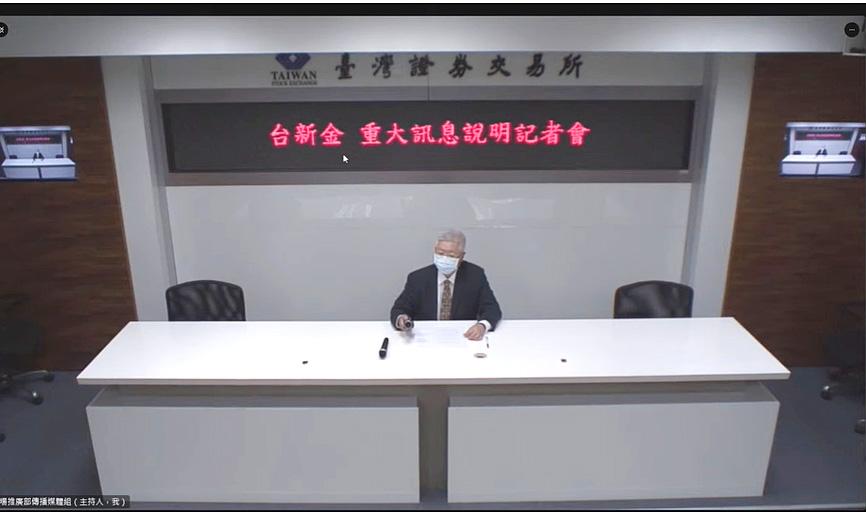Taishin Financial Holding Co (台新金控) has settled a dispute with the Ministry of Finance over the management rights in Chang Hwa Bank (CHB, 彰化銀行) and withdrawn its Supreme Court case against the ministry, the company said yesterday.
“We have filed a notice of withdrawal with the Supreme Court, after the ministry and Taishin obtained a satisfactory consensus thanks to the coordination of the Supreme Court judges and mediators,” Taishin Financial president Welch Lin (林維俊) told a news conference at the Taiwan Stock Exchange in Taipei.
The dispute began when Taishin Financial filed a lawsuit against the ministry in December 2014, alleging that it had broken a contract they signed in 2005 about the allocation of board seats at the bank.

Photo: screengrab from the Internet
In 2005, Taishin Financial secured a 22.5 percent stake from the ministry in then-financially strained CHB for NT$36.5 billion (US$1.22 billion at the current exchange rate) and gained a majority on the bank’s board.
However, when the ministry gained a majority on CHB’s board in December 2014, Taishin accused it of breaking its 2005 promise to help Taishin obtain the majority control of the bank.
Taishin had sought NT$10 billion in damage for losses, saying it would not be able to consolidate CHB as a subsidiary because it had lost most of its seats in the state-run bank.
In a joint statement released yesterday, Taishin Financial and the ministry said that to ensure both parties benefit, they would encourage collaboration among their subsidiaries and financial agencies, adding that they are optimistic about cooperation plans.
“The [Ministry of Finance] recognizes Taishin Financial’s contributions through its management team to improving CHB’s performance, strengthening the bank’s corporate governance and boosting profits for shareholders during the nine years (from 2005 to 2014),” the statement said.
Taishin Financial’s capital injection of NT$36.5 billion into CHB in 2005 enabled the bank to write off bad loans, optimize its financial structure and improve its infrastructure, the statement said.
Moreover, CHB’s performance has continued to improve as its net worth has expanded by NT$52.2 billion to NT$171.4 billion over the past seven years, it said.
Prior to yesterday’s announcement, Taishin Financial in 2020 announced that it would sell CHB shares to fund its acquisition of Prudential Life Insurance Co of Taiwan (保德信人壽).

SEMICONDUCTORS: The firm has already completed one fab, which is to begin mass producing 2-nanomater chips next year, while two others are under construction Taiwan Semiconductor Manufacturing Co (TSMC, 台積電), the world’s largest contract chipmaker, plans to begin construction of its fourth and fifth wafer fabs in Kaohsiung next year, targeting the development of high-end processes. The two facilities — P4 and P5 — are part of TSMC’s production expansion program, which aims to build five fabs in Kaohsiung. TSMC facility division vice president Arthur Chuang (莊子壽) on Thursday said that the five facilities are expected to create 8,000 jobs. To respond to the fast-changing global semiconductor industry and escalating international competition, TSMC said it has to keep growing by expanding its production footprints. The P4 and P5

DOWNFALL: The Singapore-based oil magnate Lim Oon Kuin was accused of hiding US$800 million in losses and leaving 20 banks with substantial liabilities Former tycoon Lim Oon Kuin (林恩強) has been declared bankrupt in Singapore, following the collapse of his oil trading empire. The name of the founder of Hin Leong Trading Pte Ltd (興隆貿易) and his children Lim Huey Ching (林慧清) and Lim Chee Meng (林志朋) were listed as having been issued a bankruptcy order on Dec. 19, the government gazette showed. The younger Lims were directors at the company. Leow Quek Shiong and Seah Roh Lin of BDO Advisory Pte Ltd are the trustees, according to the gazette. At its peak, Hin Leong traded a range of oil products, made lubricants and operated loading

The growing popularity of Chinese sport utility vehicles and pickup trucks has shaken up Mexico’s luxury car market, hitting sales of traditionally dominant brands such as Mercedes-Benz and BMW. Mexicans are increasingly switching from traditionally dominant sedans to Chinese vehicles due to a combination of comfort, technology and price, industry experts say. It is no small feat in a country home to factories of foreign brands such as Audi and BMW, and where until a few years ago imported Chinese cars were stigmatized, as in other parts of the world. The high-end segment of the market registered a sales drop

Citigroup Inc and Bank of America Corp said they are leaving a global climate-banking group, becoming the latest Wall Street lenders to exit the coalition in the past month. In a statement, Citigroup said while it remains committed to achieving net zero emissions, it is exiting the Net-Zero Banking Alliance (NZBA). Bank of America said separately on Tuesday that it is also leaving NZBA, adding that it would continue to work with clients on reducing greenhouse gas emissions. The banks’ departure from NZBA follows Goldman Sachs Group Inc and Wells Fargo & Co. The largest US financial institutions are under increasing pressure